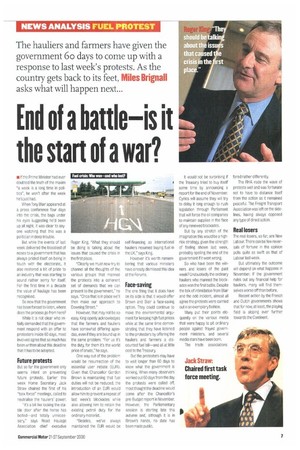End of a battle is it the start of a war?
Page 9

If you've noticed an error in this article please click here to report it so we can fix it.
The hauliers and farmers have given the government Go days to come up with a response to last week's protests. As the country gets back to its feet, Miles Brignall asks what will happen next...
• If the Prime Minister had ever doubted the truth of the maxim "a week is a long time in politics", he won't after the week he's just had.
When Tony Blair appeared at a press conference four days into the crisis, the bags under his eyes 'suggesting he'd been up all night, it was clear to anyone watching that this was a politician in deep trouble.
But while the events of last week delivered the bloodiest of noses to a government that has always prided itself on being in touch with the electorate, it also restored a bit of pride to an industry that was starting to sound rather sorry for itself. For the first time in a decade the value of haulage has been recognised.
So now that the government has been forced to listen, where does the process go from here?
While it is not clear who initially demanded that the government respond with an offer to protesters inside 60 days, most involved agree that so much has been written about this deadline that it has to be adopted.
Future protests
But so far the government only seems intent on preventing future protests, Earlier this week Home Secretary Jack Straw chaired the first of his 'task force" meetings, called to neutralise the hauliers' power.
it's a bit like locking the stable door after the horse has bolted—and totally unnecessary," says Road Haulage Association chief executive Roger King. 'What they should be doing is talking about the issues that caused the crisis in the first place.
"Clearly we must now try to channel all the thoughts of the various groups that manned the protests into a coherent set of demands that we can present to the government," he says. "Once that is in place we'll then make our approach to Downing Street."
However, that may not be so easy. King openly acknowledges that the farmers and hauliers have somewhat differing agendas, even if they are bound up in the same problem. "For us it's the duty, for them it's the world price of crude," he says.
One way out of the problem would be resurrection of the essential user rebate (ELM). Given that Chancellor Gordon Brown is maintaining that fuel duties will not be reduced, the introduction of an EUR would allow him to prevent a repeat of last week's blockades while also allowing him to retain the existing petrol duty for the ordinary motorist.
"Besides, we've always maintained the EUR would be self-financing as international hauliers resumed buying fuel in the UK," says King.
However it's worth remembering that various ministers have already dismissed this idea at the Forums.
Face-saving
The ore thing that it does have on its side is that it would offer Brown and Blair a face-saving option. They could continue to make the environmental argument for keeping high fuel prices while at the same time demonstrating that they have listened to the protesters by offering the hauliers and farmers a discounted fuel bill—and all at little cost to the Treasury.
But the protesters may have to wait longer than 60 days to know what the government is thinking. When many observers worked out 60 days from the day the protests were called off, most thought the deadline would come after the Chancellor's pre-Budget report in November. However, the Parliamentary session is starting late this autumn and, although it is in Brown's hands, no date has been made public. It would not be surprising if the Treasury tried to buy itself some time by announcing a report for the end of November. Cynics will assume they will try to delay it long enough to rush legislation through Parliament that will force the oil companies to maintain supplies in the face of any renewed blockades.
But by any stretch of the imagination this would be a highrisk strategy, given the strength of feeling shown last week, probably spelling the end of the government if it went wrong.
So who have been the winners and losers of the past week? Undoubtedly the ordinary hauliers who manned the blockades won the first battle. Despite the talk of intimidation from Blair and the odd incident, almost all agree the protests were carried out in an exemplary fashion.
Many put their points eloquently on the various media that were happy to pit ordinary people against frayed government ministers, and several media stars have been born, The trade associations fared rather differently.
The RHA rode the wave of protests well and was fortunate not to have to distance itself from the action as it remained peaceful. The Freight Transport Association was left on the sidelines, having always opposed any type of direct action.
Real losers
The real losers, so far, are New Labour. There can be few reversals of fortune in the opinion polls quite as swift as that of Labour last week.
But ultimately the outcome will depend on what happens in November. If the government rules out any financial help for hauliers, many will find themselves worse off than before.
Recent action by the French and Dutch governments shows that for now, at least, the playing field is sloping ever further towards the Continent.












































































































